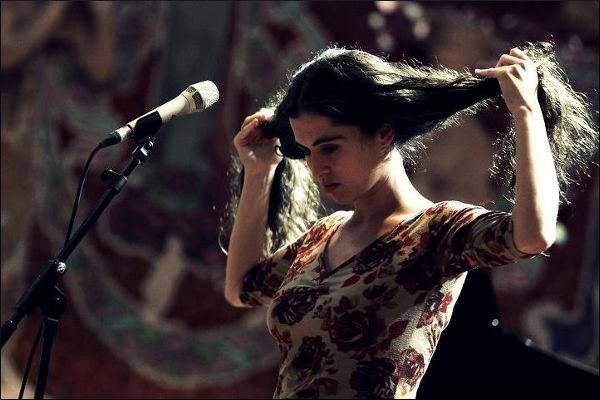
- Vestida de nit
- Released in: 2013
In this stirring habanera, Sílvia Pérez Cruz sings about sea travel, memory, nostalgia, old age, and youth.

In this stirring habanera, Sílvia Pérez Cruz sings about sea travel, memory, nostalgia, old age, and youth.

Every summer in the coastal town of Calella de Palafrugell, in Catalonia, more than 40,000 people gather together to enjoy a traditional habanera concert, a musical style that originated in Cuba during the 19th century. A good friend of mine once sent me a video of a recent performance. “I watched this concert on TV,” she explained. “My mum was seated on a couch and I was on another one. We weren’t paying too much attention to the screen, but when that song ended, we realized that we were both crying, and we couldn’t say anything for a couple of minutes.”
The song was "Vestida de nit" (Dressed for the Night) and it was performed by Sílvia Pérez Cruz, the current darling of Catalan traditional music. She started singing at the age of twelve in small taverns around the northern towns of Catalonia, a passion she inherited from her dad Càstor Pérez, also an acclaimed habanera composer. Although the habanera started out as a rhythm meant to be danced to, it soon became a genre of its own. Even though it is not the preferred type of music in its Caribbean country of origin, it found a warm welcome in Spain, thanks to Spanish emigrants who brought it back home after doing business on the island in the 19th century. The slow rhythms of the habanera, usually played by stringed instruments, create a perfect atmosphere for this genre to relate old tales about young travelers moving to other continents looking for a better life.
Home and family are left behind, and that is what’s sung about: first loves, farewells, and the homeland. "Vestida de nit" is a genuine example, as it talks about longing for old times in Cuba once back in Catalonia. Right in the first verse, Pérez Cruz shows her respect towards her delicate habanera, as instead of writing notes for it she “paints” them. The picture formed by the sea, the foam, the seagulls, and the pines soon becomes a nostalgic landscape she wants to be swallowed by, as she will sing in the chorus: “Si pogués fer-me escata i amagar-me a la platja” (I wish I could grow scales and hide at the beach). Just when one might think she is singing about her family and homeland, we are given the key to the song: what she actually misses are the “sons i tardes del passat” (sounds and evenings of the past) that are “perfumat de lluna, foc i rom” (perfumed by the moon, fire, and rum). Along with the drinks, she wants to bring back the love and calm she found in Cuba. If the rum and the palm trees are symbols of Cuba, the “cala” (small bay) is the symbol of Catalonia, where she would “make a cot” for the Caribbean palm trees with the “scallops” she has at her Mediterranean feet.

The second part of the song expresses admiration for those who traveled to Cuba, mostly fishermen and sailors. This is why all the sea elements are so important, since sea-related business was the main motivation for those who left, some of whom never came back. Since this second part is more complex in terms of subject matter, so the literary means are also more elaborate. This fine-grained piece, though, follows an uncomplicated syntactical structure, full of simple words that merely describe the seaside landscape and explain the feeling of loving two countries that seem to be so distant in time and space.
Language relates to home. Several words in the lyrics, though perfectly understandable, make one think of alternatives one would now use in spoken Catalan, thanks to the mix with Spanish. This is the case of the term for “restlessness,” as the lyrics use the older Catalan form “neguit” instead of “inquietud,” much more common in contemporary Catalan. “Cerco” – from the verb “cercar” – is an older version of “seek,” which many Catalans would now say as “buscar,” just like someone from Madrid speaking Spanish. Other examples include the word for “scale,” written as “escama” in modern Spanish and Catalan, though it has another Catalan form, “escata,” which is the one chosen here. The exact same thing happens with “espuma,” the Spanish word for “foam,” which is also accepted in Catalan, though here the older “escuma” is preferred.
It’s interesting that a tradition of purer Catalan – not mixed with Spanish – is kept alive within a musical genre that comes from a Spanish-speaking country and that, even in Catalonia, was first sung in Spanish. This gives the nostalgic notion of a missed homeland a deeper meaning. It also makes these songs sound much older, given that most of them have been composed within the last 50 years. The voice of this talented 30-year-old artist, singing lyrics composed by her mum and dad, is something to cherish, to enjoy in silence and, if possible, in front of the sea. If that cannot be, then closing one’s eyes should be enough to travel through this fairytale of old heroes, vessels, oceans, and life-changing journeys.

Lyrics in Catalan:
1
Pinto les notes d’una havanera
blava com l’aigua d’un mar antic.
Blanca d’escuma, dolça com l’aire,
gris de gavines, daurada d’imatges,
vestida de nit.
Miro el paisatge, cerco paraules,
que omplin els versos sense neguit.
Els pins m’abracen, sento com callen,
el vent s’emporta tot l’horitzó.
Tornada
Si pogués fer-me escata
i amagar-me a la platja
per sentir sons i tardes del passat,
d’aquest món d’enyorança,
amor i calma, perfumat de lluna, foc i rom.
Si pogués enfilar-me a l’onada més alta
i guarnir de palmeres el record,
escampant amb canyella totes les cales
i amb petxines fer-lis un bressol.
2
Els vells em parlen plens de tendresa,
d’hores viscudes amb emoció.
Joves encara, forts i valents,
prínceps de xarxa, herois de tempesta,
amics del bon temps.
Els ulls inventen noves històries,
vaixells que tornen d’un lloc de sol.
Porten tonades enamorades.
Dones i Pàtria, veles i flors.
Tornada
Lyrics in English:
1
I paint the notes for an habanera
blue as the water of an ancient sea
white of foam, sweet as the air
gray of seagulls, golden with pictures,
dressed for the night
I observe the landscape, seek for words
to fill the verses without restlessness.
The pines embrace me, I feel how they keep quiet
the wind blows away the whole horizon
Chorus
If only I could grow scales
And hide at the beach
so I could hear sounds and evenings of the past
of this world of longing, love and calm, perfumed by moon, fire and rum
If only I could climb on the highest wave
and adorn with palm trees my memory
whilst I spread cinnamon on every small bay
and with scallops I make for them a cot.
2
Old people talk to me full of tenderness
about hours lived with emotion.
Yet young, strong and brave.
Net princes, storm heroes
friends with nice weather
The eyes make new tales up.
Boats come back from a place under the sun.
They bring chorus in love, women and homeland,
candles and flowers.
Chorus